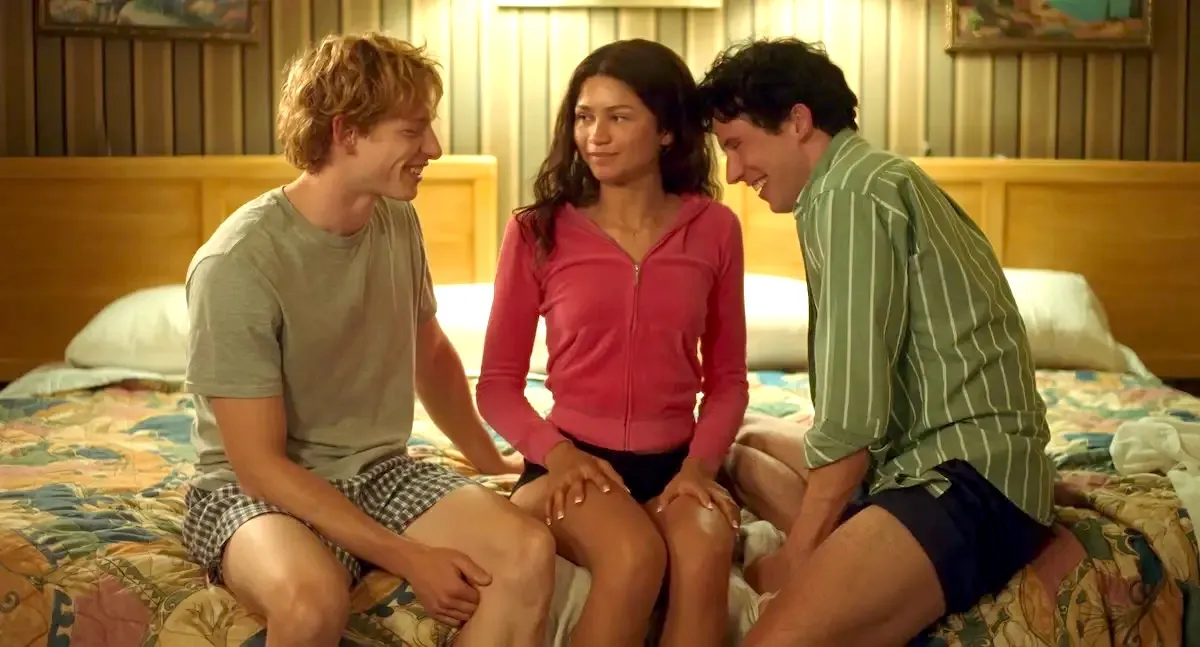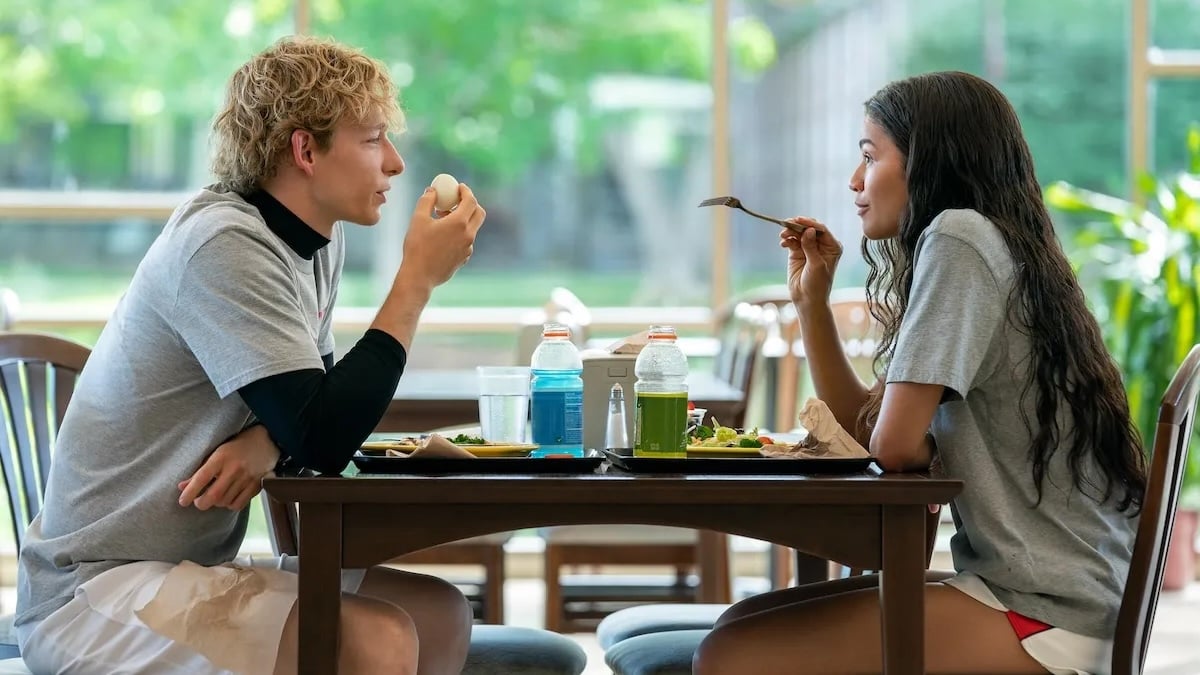It is not easy to make a love triangle feel fresh and new, but tennis drama Challengers manages to craft a compelling narrative that gets its hooks in you and refuses to let go. That is all thanks to Justin Kuritzkes’ characters and story he has crafted (and Luca Guadagnino’s vision).
The film feels like a tennis match in many ways, including in how these characters talk to each other. Kuritzkes had to balance that in his writing and he said it was one of his “guiding principles” throughout the process. Talking to him about the screenplay and these characters, it is clear that he knew exactly what he wanted from the three of them throughout the writing process.
“I wanted whatever was happening on the court to inform whatever was happening in the scenes and then vice versa,” he said. “Whatever was happening in the scenes was gonna inform what was happening on the court because I wanted the drama of each to amplify the drama of the other.”
The sexiest movie of the year with no sex in it
One of the aspects of Challengers that really threw me for a loop was how hot it was despite not having a sex scene in it. When the trailers were first released, many of us thought this was going to be a movie with a lot of sex playing a part in the film, and in its own way, it does—just offscreen. When I asked Kuritzkes about the lack of sex scenes and how that came to be, he said that it was pretty much always written that way.
“It’s a movie about people who are trying to have a conversation with each other. And in some ways, the only the place where they can have that conversation most clearly is on the tennis court without their words through action,” Kuritzkes said. “They say a lot of stuff to each other in this movie, but the most important stuff is always said with the way that they play tennis. And so I kind of was always, and this is something that Luca and the actors and our DP and costume designer, everybody brought to this movie, but that there’s real drama happening in the action and character is being defined by the way these people behave on a tennis court. They’re getting something there that they can’t get in the rest of their lives.”
That works to the film’s advantage, as a lot of the story is told through flashbacks. When I asked about whether or not that was a freeing experience or something that would hinder him at times as a writer, Kuritzkes said, “It’s kind of more freeing because you can always just be watching the important stuff, there’s no filler in this movie. There’s not a lot of easing into anything. Every time we’re in the match, it’s high stakes. And every time we’re going back to a moment in the past, it’s high stakes. So in a way that structure was very freeing in that you could just go right to the moment in these people’s lives that you wanted to show, not always worry about how you get there.”
The reaction to Challengers
As we were talking, I told Kuritzkes that one of the first things someone said after I first saw the film was just “Josh O’Connor’s thighs,” and it was all this person could think in that moment—which is to say that after you experience Challengers, it will definitely take a minute for you to wrap your head around everything.
As a writer, Kuritzkes loves that people are first experiencing the film before making a jump reaction about it. “That’s really exciting. You want a film to be experienced, viscerally and emotionally first, before it’s analyzed, before somebody sort of starts thinking about it,” he said. “You want them to feel it. You want it to operate on the level of energy. And also because I think that makes it a movie that anybody can click into. If you don’t have to come into it with a point of view right away, and you can just kind of feel it taking you somewhere, that’s really exciting. That’s exactly how I hope it happens.”
My favorite part of the movie is a silent communication that Patrick (Josh O’Connor) and Art (Mike Faist) share with each other earlier in the film that comes back in the 2019 sequence. It’s one of those moments that figuring it out makes you so “hype” about it that you want to jump up and down. When I asked Kuritzkes about creating something that could illicit that kind of reaction from the audience, he said that he can only think of his own reaction and how that all fits with those characters.
“Well, you can only think about your own reaction,” Kuritzkes said. “Epecially when you write a movie like this, which I did on spec, where there’s nobody attached to it. You’re kind of just writing it for you. So you’re really just writing a movie that you wanna see that doesn’t exist. And so you’re trying to see it on the page. So with moments like that, I’m only going on what I would find exciting. That’s kind of all you have to go on, you don’t know what it’s like to be another person. You only know what it’s like to be you. But if you try to write something for you, you’re then surprised when you find out that there’s other people like you. That’s kind of the journey of writing anything.”
Crafting the complexities of Tashi
Tashi (Zendaya) isn’t a woman who will sugarcoat things. She is a bitch (affectionately) and doesn’t care that you think that because she wants to win and make those around her winners in the process. A woman like that in a movie is rare because they either have to be sweet and kind or so evil you hate them. Tashi doesn’t exist in either of those categories.
When I asked Kuritzkes about Tashi, he talked about bringing that complex nature to life in her character. “You’re trying to just write a person who’s as complex and up as the people you meet, the people in the world. And I think it’s especially important with any character that they exist for themselves,” Kuritzkes said. “That whatever other people feel about them, they’re on their own journey. They want their own things in from life and from each other. And so much of the drama happens when those things don’t match up, when a character needs or wants something from another character that needs or wants something different. Then so much of the sort of dance that they’re gonna do together is about either finding some place where they can meet or pushing through each other, you know? So, with her, I certainly never care about making a character likable or something.”
He went on to say that likability isn’t a goal, and he just wants to find more dynamic characters instead. “I think if you make a character that’s dynamic and that is complicated, people will empathize with them, which is much more important than whether people like them. I don’t go to movies to like people, I go to movies to empathize with them. Honestly, most of the time when I go to movies and I can tell that a character wants me to like them, I end up not liking them because they don’t feel like a person. They feel like an advertisement and I don’t wanna spend two hours with somebody who’s not a person.”
The wife guy versus the challenger
Patrick pushes Tashi’s buttons and has he, Art, and Tashi all met—the opposite of Art, who is what I would consider a “total wife guy.” Writing for characters like that cannot be easy because Art is so dedicated to her that, at times, he doesn’t even fight back. For Kuritzkes, it was about keeping all those characters surprising to the audience.
“I think it was important with all of them that you find moments in the movie where they surprise you, where they start acting like each other, when they start sort of rubbing off on each other,” he said. “Because I think that that happens in any dramatic story between three characters, but especially in a love triangle. They start to sort of learn from each other and give each other a taste of their own medicine. I hope that there’s a few different readings of Art and Patrick and Tashi and I hope people come out of the movie feeling different ways about each of the characters and their motivations and who they think is being manipulative or who they think is being sincere or any of that. I hope it’s not easy to pin any of them down.”
So throuple? Throuple.

From the jump, I thought these three characters were all just going to be in a polyamorous relationship with each other. When that did not happen, I had to wonder why they didn’t just accept their love for each other. Koritzkes laughed and attributed it to the audience’s ability to take whatever they will from Challengers.
“I think if people are reading it that way, that’s totally their prerogative. That’s good for them,” he said and went on to talk about the film’s expectation going in versus what you can think leaving the film. “I think if people go in expecting it to be a movie about three people who are consciously making a decision to be in a throuple, they’re gonna see a different movie. It’s really not that. But yeah, if people take that away from it, that’s up to them.”
Challengers is in theaters now.
(featured image: Niko Tavernise/Metro Goldwyn Mayer Pictures)










Published: Apr 25, 2024 03:14 pm